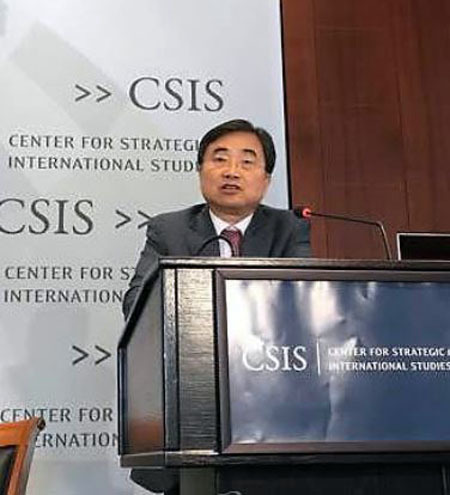WASHINGTON -- South Korea cannot accept war as an option to deal with the North Korean nuclear threat, a senior Seoul diplomat said Tuesday in the wake of Pyongyang's sixth and most powerful atomic test.
Second Vice Foreign Minister Cho Hyun reminded a forum here that Washington has repeatedly put "all options" on the table over North Korea's nuclear and ballistic missile programs.
But war cannot be an option, he said.
"I understand the need to stress that all options are on the table," Cho told the forum hosted by the Center for Strategic and International Studies and the Korea Foundation. "But we should be careful that this does not translate into an escalation of war or cause miscalculation of North Korea."
Talk of war has persisted since US President Donald Trump threatened to unleash "fire and fury" on Pyongyang following its two intercontinental ballistic missile tests in July.
"Given the calamity a war would bring about, we cannot accept a war as an option," Cho said. "This is not because we are weak or we are cowards, but indeed, because we have only too vivid memories of the Korean War."
Second Vice Foreign Minister Cho Hyun reminded a forum here that Washington has repeatedly put "all options" on the table over North Korea's nuclear and ballistic missile programs.
But war cannot be an option, he said.
"I understand the need to stress that all options are on the table," Cho told the forum hosted by the Center for Strategic and International Studies and the Korea Foundation. "But we should be careful that this does not translate into an escalation of war or cause miscalculation of North Korea."
Talk of war has persisted since US President Donald Trump threatened to unleash "fire and fury" on Pyongyang following its two intercontinental ballistic missile tests in July.
"Given the calamity a war would bring about, we cannot accept a war as an option," Cho said. "This is not because we are weak or we are cowards, but indeed, because we have only too vivid memories of the Korean War."

The vice minister emphasized the need for dialogue with Pyongyang, noting there are two types -- one aimed at the North's denuclearization and the other at easing cross-border military tensions and addressing humanitarian issues.
The former should be resumed under the "right conditions,"
including the cessation of North Korea's provocations and threats, but the latter could proceed without undermining the sanctions and pressure campaign against Pyongyang and it would not be a "strategic mistake," according to Cho.
"We really hope that someday, it will eventually create an environment favorable to a dialogue, the first dialogue, for denuclearization," he said. "It may sound unrealistic today but we cannot abandon it."
On Sunday, North Korea conducted its sixth nuclear test, claiming it had successfully detonated an H-bomb that can be mounted on a long-range missile.
On how to cope with the evolving threat from the North, Cho said that South Korea will continue sanctions and pressure, calling them the "only solution" to lead the North to the negotiating table in the end.
He underlined the importance of China in better effectively reigning in the North.
"We will continue sanctions and pressure, which will eventually lead North Korea to the dialogue table, the only solution for North Korea. Encouraging China to get on board in these sanctions and pressure campaign will be crucial," he said.
He blamed the North "wholly" for the current nuclear stalemate but still cited "intrinsic constraints" for South Korea and the US in their efforts to deal with the communist state for decades.
"First is the fact that we are democracies. As democratic countries, we have elections and changes of governments. And accordingly, changes of policies, which North Korea took advantage of, while sticking to their aim of nuclear ambitions," he said.
"Second, the US, as a global power, seemed at times to have been distracted by some other priority issues. This may have left some room for North Korea to pursue its nuclear ambitions," he added.
Against this backdrop, he called for more concerted denuclearization efforts "more focused efforts for a longer period of time.
"We need strategy, well-tuned by our two countries," he said.








![[Kim Seong-kon] Democracy and the future of South Korea](http://res.heraldm.com/phpwas/restmb_idxmake.php?idx=644&simg=/content/image/2024/04/16/20240416050802_0.jpg&u=)








![[KH Explains] Hyundai's full hybrid edge to pay off amid slow transition to pure EVs](http://res.heraldm.com/phpwas/restmb_idxmake.php?idx=652&simg=/content/image/2024/04/18/20240418050645_0.jpg&u=20240418181020)

![[Today’s K-pop] Zico drops snippet of collaboration with Jennie](http://res.heraldm.com/phpwas/restmb_idxmake.php?idx=642&simg=/content/image/2024/04/18/20240418050702_0.jpg&u=)